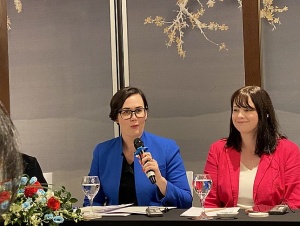Promoting green innovation in agriculture
 |
| Deputy Minster of Planning and Investment Nguyen Thi Bich Ngoc |
On September 17, the National Innovation Centre (NIC) under the Ministry of Planning and Investment (MPI) in collaboration with the Vietnamese Australian Scholars & Experts Association (VASEA) held a conference on “Promoting green innovation in agriculture through market mechanism”.
The conference aimed to provide updated information on green agriculture through the market mechanism, boost green innovation in agriculture, as well as to promote cooperation and investment between Vietnam and Australia.
Deputy Minister of Planning and Investment Nguyen Thi Bich Ngoc said that agriculture contributes about 12 per cent of GDP, providing livelihoods for about 30 per cent of the workforce. However, this sector is also struggling with big challenges such as climate change. The Mekong River Delta area - the country's largest rice granary - is forecast to lose about 500,000 - 1 million hectares of agricultural land by 2050 due to rising sea levels, causing annual losses of up to 3 per cent of GDP.
"Therefore, green agriculture is emerging as an inevitable solution for sustainable development in Southeast Asia. Vietnam -an agricultural country - is a promising land for green agriculture. Investment in technology, a young workforce, and supportive government policies create a lot of favourable conditions for Vietnam to implement green transformation in agriculture successfully," Ngoc said.
However, to fully exploit this potential, Vietnam needs to overcome some barriers, she added. One of the major challenges is human resources, especially high-quality ones, in the agricultural sector. There is a lack of experts and engineers who can manage high technology, while the rate of untrained rural workers is still very high.
"Farmers need to be properly trained in advanced farming methods, sustainable land management and efficient use of resources. In addition, access to green technologies, new crop varieties and investment is still limited," Ngoc emphasised. "Start-ups in the green agriculture sector also face difficulties in connecting with experts, accessing markets and expanding production scale. Lack of infrastructure and resources is also a major barrier that needs to be addressed to promote the development of these businesses."
 |
| NIC and VASEA signing the memorandum of understanding |
The conference's experts provide updates, guidance, and recommendations on promoting green agriculture through market mechanisms through some topics like Enabling farmers to adopt climate change mitigation via a carbon market, Promoting green innovation in agriculture via market mechanisms, and Making environmental benefits of low-emission farming techniques eligible for trade-guiding farmers and farming enterprises through the carbon certification process.
Do Nam Thang from Crawford School of Public University and Australian National University highlighted the role of reducing emissions from rice cultivation. Vietnam's methane target is a 30 per cent reduction by 2030, while rice's impact is 48 per cent of agriculture's greenhouse gas emissions and 75 per cent of methane emissions from rice alone.
"Emission cuts in rice are more affordable than in livestock. This is essential to meet national and global commitments," Thang affirmed.
Chu Hoang Long from Australian National University said that overall rice producers incur costs to reduce greenhouse gas emissions. "Rice producers should be compensated for reducing GHG emissions, and market mechanisms are generally considered an efficient way to compensate, the reduction in emissions is compensated via trading carbon credits. However, market mechanisms require a certification process and should be designed in line with national goals."
Also at the conference, the NIC and VASEA signed the memorandum of understanding, marking a significant milestone for the bilateral relationship for green innovation in agriculture.
 | Overcoming challenges to unlock green agriculture in Vietnam Developing large-scale green agriculture in Vietnam faces several challenges, including land consolidation, infrastructure needs, and building market trust. Smart farming practices and supportive policies are crucial to meeting Vietnam's ambitious agricultural goals and expanding its export market. |
 | Leveraging technology to boost Vietnamese agricultural prosperity For many years, Nestlé has transformed Vietnam’s agriculture by pioneering sustainable farming and fostering robust rural communities through through the adoption of science and technological innovation. Le Thi Hoai Thuong, Nestlé Vietnam’s senior corporate affairs manager, talked to VIR’s Mai Anh about the company’s trajectory and what they have done to advance Vietnamese regenerative agriculture. |
 | US Department of Agriculture launches trade mission in Vietnam US Department of Agriculture Under Secretary for Trade and Foreign Agricultural Affairs Alexis M. Taylor arrived in Ho Chi Minh City this week to launch a US Department of Agriculture (USDA)-sponsored agribusiness trade mission. |
What the stars mean:
★ Poor ★ ★ Promising ★★★ Good ★★★★ Very good ★★★★★ Exceptional
Related Contents
Latest News
More News
- Trung Nam-Sideros River consortium wins bid for LNG venture (January 30, 2026 | 11:16)
- Vietnam moves towards market-based fuel management with E10 rollout (January 30, 2026 | 11:10)
- Envision Energy, REE Group partner on 128MW wind projects (January 30, 2026 | 10:58)
- Vingroup consults on carbon credits for electric vehicle charging network (January 28, 2026 | 11:04)
- Bac Ai Pumped Storage Hydropower Plant to enter peak construction phase (January 27, 2026 | 08:00)
- ASEAN could scale up sustainable aviation fuel by 2050 (January 24, 2026 | 10:19)
- 64,000 hectares of sea allocated for offshore wind surveys (January 22, 2026 | 20:23)
- EVN secures financing for Quang Trach II LNG power plant (January 17, 2026 | 15:55)
- PC1 teams up with DENZAI on regional wind projects (January 16, 2026 | 21:18)
- Innovation and ESG practices drive green transition in the digital era (January 16, 2026 | 16:51)

 Tag:
Tag:

























 Mobile Version
Mobile Version